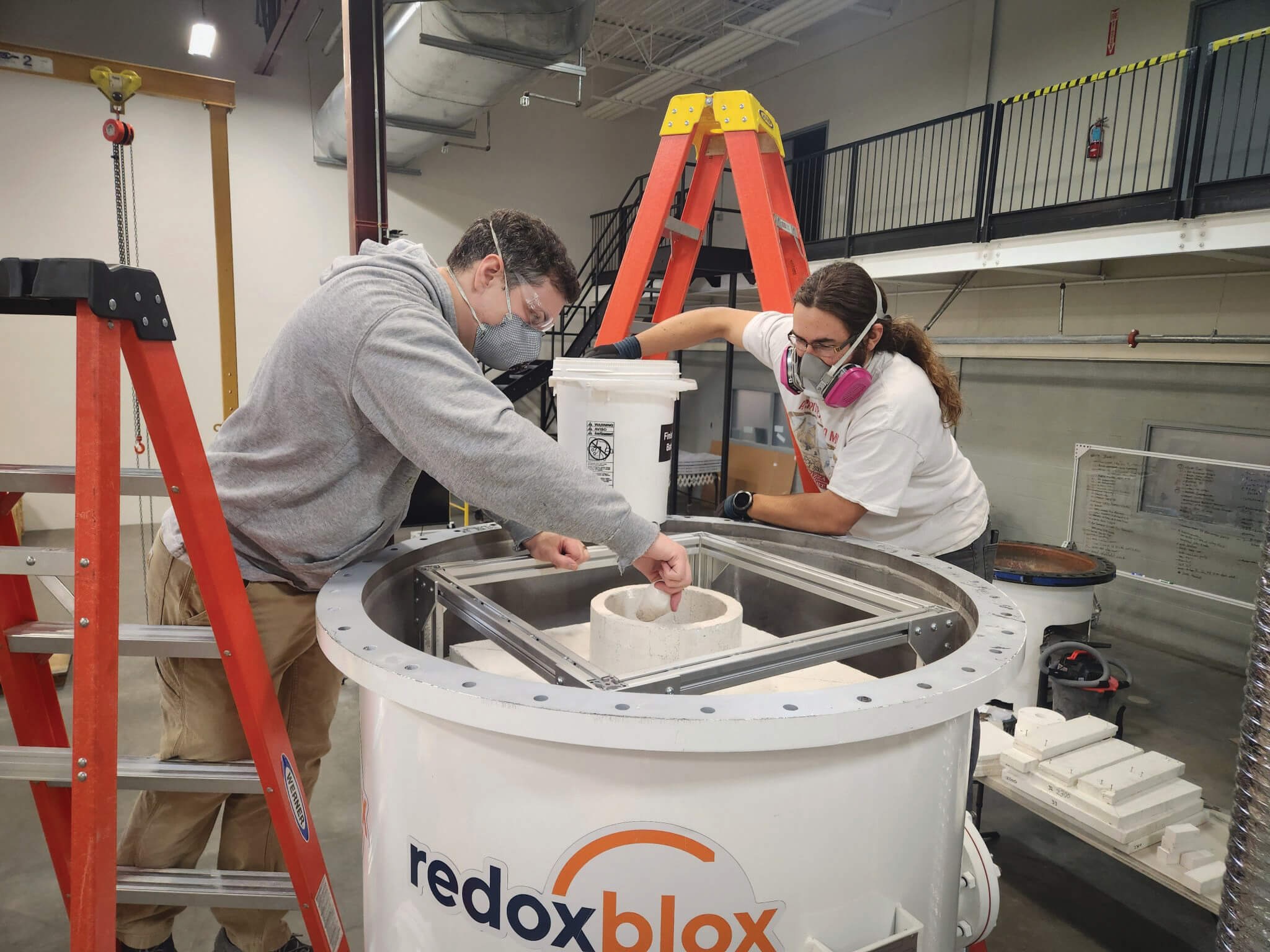For more than 50 years, the Michigan State University Research Foundation has empowered groundbreaking research and entrepreneurship at MSU, creating an ecosystem of innovation and discovery that drives economic growth across Michigan and beyond.
The 501(c)(3) corporation, which is co-located within the MSU Innovation Center, was established in 1973 by the late MSU President Clifton Wharton Jr. as a nonprofit to “bring into being a strong, viable instrument to help serve the university.” The foundation remains a catalyst for turning ideas into real-world solutions.
“Much of our activities are centered around driving economic development through startup creation, job creation and regional partnerships,” said David Washburn, chief executive officer of the MSU Research Foundation.
The foundation partners with MSU Technologies, the tech transfer office of the university, and MSU Business Connect to deliver a vision that has translated into transformative accomplishments over the past year, demonstrating the foundation’s role in strengthening communities, championing discovery and supporting industry-changing breakthroughs.
Investing to strengthen research at MSU
Awarding $11.8 million in grants in 2023-24 — contributing nearly $400 million since its inception — the foundation has helped position MSU as a leading global public research university on the rise. Working closely with the vice president of research and innovation as well as the provost, the foundation grants ensure MSU researchers have the resources to address pressing challenges the world faces. The foundation is a unique asset to the university, providing resources that help recruit and retain faculty, support student fellowships, build new facilities and acquire equipment and advance the arts.

MSU Research Foundation Professorships, for example, are a recognition awarded to distinguished faculty members and provide critical resources to advance their research and impact. Established in 2014, the program supports highly accomplished scholars with funding for five years, enabling them to tackle ambitious projects, mentor students and foster interdisciplinary collaboration.
With more than 60 faculty honored to date, the professorships help MSU retain top talent and attract leading researchers from around the world. Recently, renowned plant biologist Seung Yon “Sue” Rhee, a professor in the colleges of Natural Science and Agriculture and Natural Resources and director of MSU’s Plant Resilience Institute, joined MSU as she works to improve agricultural resilience to climate change.
“The MSU Research Foundation Professorship has enabled me to quickly establish and run my lab at MSU. Success of our lab transition and operation is evident from several new federal grants that we were awarded for nearly $10 million,” said Rhee. “These and our previously funded grants that are now operating at MSU are worth over $25 million. My group collaborates with approximately 200 research groups, and our projects serve tens of thousands of plant researchers around the world.”
The MSU Research Foundation announced a $5 million grant to support infrastructure and research in plant science and global sustainability in January 2023. This grant complements the university’s and state of Michigan’s investment in the greenhouse complex, which is expected to help establish programming and equipment for the new 200,000-square-foot Plant and Environmental Sciences Building, which is currently under construction at the corner of Farm Lane and Wilson Road.
Helping attract and keep top talent
The MSU Research Foundation has built an extensive system of resources to help drive the development of a high-tech entrepreneurial ecosystem. The Entrepreneur-In-Residence program supports workforce development and new venture creation that helps create and retain top professional talent in the high-tech, high-growth workspace.
One notable example of the foundation’s transformative work is related to the Tech Hubs initiative of the U.S. Economic Development Administration, or EDA. The foundation’s proposal, the Materials Advancement and Research Solutions, or MARS, is focused on advanced materials that are critical to industries like semiconductor manufacturing, defense electronics and quantum computing. Working with the MSU College of Engineering and Fraunhofer USA, the foundation is leading the development of this program and recently won a $500,000 Strategy Development Grant from the EDA. By leveraging MSU’s expertise in synthetic diamonds and rare isotopes, MARS aims to create jobs and drive economic growth in Michigan. It is expected that in 2025, the EDA will make a call for proposals from Development Grant awardees to compete for up to $80 million in funding.
Similarly, the foundation is leading the development of the Sustainability Hub for an Alternative Packaging Ecosystem, or SHAPE, initiative. Funded by a $1 million National Science Foundation Regional Engines planning grant, SHAPE is reimagining how packaging materials are recycled and reused. By collaborating with regional and national partners, the initiative is positioning the Great Lakes region as a global leader in sustainable packaging. The foundation is one of 71 organizations out of nearly 300 that has been invited to submit a full proposal to the NSF Regional Engines program.
The MSU Research Foundation is the only organization in the state of Michigan to have won a planning grant for both the NSF Regional Engines and EDA Tech Hubs programs.
Powering startup success stories
The foundation’s commitment to entrepreneurship is filling a gap in the mid-Michigan region and supporting startups and emerging technologies in diverse industries. It is a long-time funder of the Burgess Institute for Entrepreneurship and Innovation at MSU, which Princeton Review recently ranked No. 11 nationally among university entrepreneurship programs.

The foundation also runs the Conquer Accelerator programs in East Lansing, Grand Rapids and Detroit. The 10-week venture accelerator program is geared toward startups commercializing MSU intellectual property but generally open to any Michigan-based company. The program has empowered more than 80 new startups to date — with an impressive 80% survival rate — helping them navigate challenges and achieve long-term success.
The Conquer Detroit Accelerator program, launched in December 2023, supports medical and health technology startups in Southeast Michigan in partnership with Henry Ford Health + MSU Health Sciences. The program provides access to Henry Ford’s clinical and research infrastructure, advancing innovation in medical devices, digital health and clinical processes. Three companies are already piloting solutions with Henry Ford Innovations, demonstrating the significant impact of the MSU Research Foundation’s targeted accelerator programs.
Bringing new companies to life with venture funding
Through its captive venture funds, Red Cedar Ventures and the Michigan Rise Pre-Seed Fund III, the foundation supports more than 200 active companies that have collectively raised over $1.2 billion in co-investments. These companies span fields such as quantum computing, advanced manufacturing and medical technologies, creating over 1,400 jobs while driving economic growth in Michigan.
Redoxblox, a startup using MSU-developed technology to revolutionize energy storage and promote decarbonization, is a notable success story. Redoxblox’s technology was developed by MSU Research Foundation Professor James Klausner and his team to capture excess renewable electricity — from sources like solar and wind — and store it for on-demand release as electricity.
“When my research team was ready to launch Redoxblox, we reached out to Spartan Innovations, and they were indispensable in providing support to launch a startup company from within MSU,” said Klausner, a mechanical engineering faculty member in the College of Engineering and Redoxblox cofounder and executive chair. “As the venture creation subsidiary of the MSU Research Foundation, Spartan Innovations made sure that Redoxblox was well connected to the venture arm of the foundation. The success we achieved can be directly traced to the early support provided by Spartan Innovations and the MSU Research Foundation.”

Backed by MSU’s entrepreneurial ecosystem, including a license to the intellectual property from MSU Technologies and investments from Red Cedar Ventures, the company has secured major partnerships and is already making a tangible impact on decarbonization efforts. As part of a Department of Energy project, Dow Chemical Company is installing a 10-megawatt-hour unit from Redoxblox at a West Virginia plant. In addition, Redoxblox closed a $40 million Series A funding round in October.
Indapta Therapeutics is another example of a technology discovered at MSU and licensed through the university. The biotechnology company is developing a groundbreaking “off-the-shelf” therapy that uses natural immune cells to target and destroy cancer cells. By harnessing a unique subset of natural killer, or NK cells, from healthy donors, the company is addressing limitations of current immunotherapies and working to bring life-changing treatments to patients battling blood and solid cancers.
Together, the foundation’s two captive ventures funds have deployed nearly $40 million in over 200 companies that have created more than 1,500 new jobs.
Creating spaces for innovation across Michigan
A host of research parks and incubator spaces across the state managed by the foundation — including locations in East Lansing, Grand Rapids and Detroit — collectively provide 165,000 square feet of office, lab and warehouse space and maintain an impressive 90% occupancy rate.
In recent years, 23 new companies have joined these spaces, representing a wide range of industries, including biotechnology, cybersecurity, renewable energy and artificial intelligence.

Each location brings unique opportunities for startups and established companies to thrive. In East Lansing, the VanCamp Incubator is a 20,000-square-foot wet lab incubator facility that provides resources for life sciences companies. In Grand Rapids, the Bridge Incubator is located in the Doug Meijer Medical Innovation Building on the Medical Mile and offers cutting-edge facilities for startups in health care and life sciences as well as software development companies, fostering partnerships with the state’s growing medical technology sector. And in Detroit, the foundation runs the Conquer Accelerator program in partnership with Henry Ford Health at Newlab within the iconic Michigan Central building. It is expected the foundation will eventually take up residence in the Fisher Building, adjacent to Henry Ford Health.
“Companies choose our spaces not only for the physical resources but also for our mentorship programs, support services and networking opportunities,” said Jeffrey Smith, director of research parks for the foundation. “Through our partners at MSU Business Connect, we also offer direct access to campus resources, helping companies accelerate their growth and identify talent.”
The Technology Innovation Center in East Lansing, which recently celebrated its 15th anniversary, has supported more than 120 high-tech startups, strengthening Michigan’s reputation as a leader in innovation.
Strengthening communities through collaboration
The foundation doesn’t just fund research and startups; it also brings people together to solve big problems.
Signature events, such as the Data Science Summit, Energy Summit, Women in Tech and an AgTech showcase, connect MSU researchers with industry leaders and talent. These events showcase MSU’s leadership in fields like artificial intelligence and sustainable agriculture.
Looking ahead, the foundation seeks to develop a multi-tenant innovation center and state-of-the-art incubation facility in East Lansing next to the TechSmith headquarters facility in the former Spartan Village site.
In September, the MSU Board of Trustees authorized university administration to negotiate a long-term ground lease and development agreement with the MSU Research Foundation for approximately five acres in the Crescent Road redevelopment area. This agreement will facilitate the development of a new facility that will serve as a multi-tenant innovation center.
“We will continue investing in cutting-edge research, supporting groundbreaking startups and further help MSU develop meaningful partnerships that bring people together to transform industries, communities and lives,” said Washburn.
Visit the MSU Research Foundation website to read the 2023-24 annual report featuring more stories of impact.
